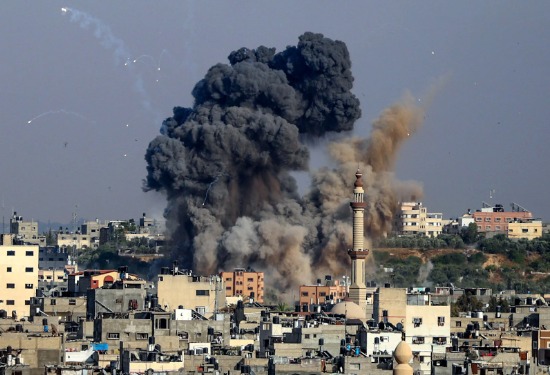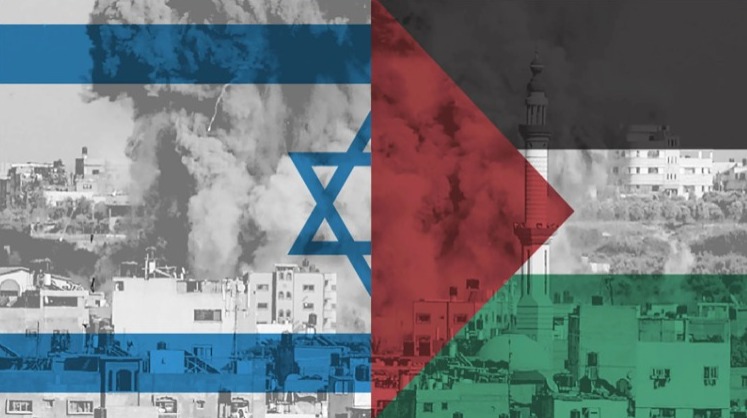In the ongoing conflict between Israel and Palestine, the Gaza-based militant group, Hamas, initiated aerial assaults and breached the heavily fortified border with Israel. The scale of violence witnessed in the region is of historic proportions, resulting in the loss of hundreds of Israeli lives, with more individuals succumbing to the devastating consequences even as we compile this article. It is a stark reminder that the ongoing strife in the region continues to exact a heartbreaking human cost on both Israel and Palestine, underscoring the urgent need for a resolution to this long-standing and tragic conflict.
What is happening between Israel and Palestine?
Hamas has launched the operation “Operation Al-Aqsa Flood” against Israel. This surprise attack involved aerial, sea and ground operations by the Palestinian group from the Gaza Strip. The entry of the group’s fighters by land was confirmed by Israel.
Rockets were shot at Israel from Gaza on 7th October 2023, from 6:30 am, following months of rising violence in the Israeli-Palestinian conflict, with the highest number of fatalities in the West Bank, which Israel occupied in the 1967 Arab-Israeli conflict.
According to Israeli media, the gunmen also opened fire on passers-by in the town of Sderot, and there is footage circulating on social media showing clashes in city streets as well as terrorists in jeeps roaming on the roads.
Israeli Prime Minister Benjamin Netanyahu’s Security Cabinet declared the country at war following the attack. In response, the blockaded coastal enclave was bombarded by Israel. The Israeli army launched its counterattack by the name of “Operation Iron Swords” against Hamas.
Up until now, the nature of Israel’s conflicts with Hamas, along with the 2006 Hezbollah-Israel conflict, was largely in the form of rocket and artillery exchanges. It is the first instance when troops have entered Israeli soil. The Arab- Israel battles have been fought outside since the 1948 war.
The origins of the Israel and Palestine conflict

In the 1920s and 1940s, a large number of Jews migrated to Palestine, while evading persecution and seeking a homeland in the wake of the Holocaust. The Ottoman Empire was defeated in World War One, after which Britain gained control of Palestine. In 1917, the Balfour Declaration was adopted in which the United Kingdom declared its support for the establishment of a “national home for the Jewish people” in Palestine.
As the friction between Jews and Arabs and resistance to British rule increased, in the second half of the nineteenth century, the United Nations adopted Resolution 181 in 1947. According to the plan, the territory was divided into Arab and Jewish states by the UK and Jerusalem was put under international administration. Though The Jewish leadership embraced the plan, the Arab side rejected it, and it was never implemented.
In 1948, as the strife continued, British authorities withdrew and Jewish leaders proclaimed the founding of Israel. In 1948, Israel’s independence was declared. This prompted surrounding Arab states to attack Israel. Thus started the first Arab-Israeli War. The war ended in 1949.
At the end of the war, Israel controlled about 50 per cent more territory than the originally envisioned UN partition plan. Jordan controlled the West Bank and Jerusalem’s holy sites, and Egypt controlled the Gaza Strip. About 750,000 Palestinians were displaced in what they call Al Nakba, or “The Catastrophe. Over the years, tensions have increased in the region between Israel and Egypt, Jordan, and Syria.
Conflicts between Israel and Palestine over the years
In 1979, there were a series of peace negotiations during which the Egyptian and Israeli representatives signed the Camp David Accords. This peace treaty ended the three decades of conflict between Egypt and Israel.
In 1982, civil war-wracked Lebanon was invaded by Israel. The move was aimed at attacking Palestinian militants. Israeli-backed Lebanese militias killed hundreds of Palestinians in refugee camps in Beirut. Israeli troops remained in southern Lebanon until 2000.
Over the years, several major and minor skirmishes have broken out between Israel and Palestine. In 1987, the first intifada, or the Palestinian uprising against Israeli rule took place in which hundreds of thousands of Palestinians living in the West Bank and Gaza Strip rose against the Israeli government. It lasted till 1993. Also In 1987, Palestinian cleric Sheikh Ahmed Yassin launched Hamas, a political group with military capabilities, as a transnational Sunni Islamist organisation.
In 1993, Yasir Arafat, leader of Palestine and Israel signed the Oslo Accords to negotiate an end to the conflict based on a two-state solution. The Oslo Accords led to the establishing of the Palestinian Authority (PA) and partial Israeli withdrawal from certain West Bank and Gaza Strip areas. Self-rule was established for the first time in the Gaza Strip.
In 2000, Palestinians launched the second intifada, which lasted until 2005.
The two Palestinian uprisings, or ‘intifadas’, profoundly impacted Israel and Palestine relations. The second ended the peace process of the 1990s and ushered in a new era of conflict. Hamas was involved in both the Intifadas.
On July 11, 2000, US President Bill Clinton convened the Camp David Summit, bringing together Israeli Prime Minister Ehud Barak and Palestinian Authority Chairman Yasser Arafat for intensive final status negotiations. Still, the summit was inconclusive, worsening the relations between the two nations further.
Developments between Israel and Palestine in the last two decades

In the 2006 Palestinian elections, Hamas won. This led to tensions with the Fatah-dominated PA. In 2007, Hamas forcibly took control of the Gaza Strip, while Fatah retained control of the West Bank. Israel’s next step was to blockade Gaza to prevent arms smuggling and attacks. The blockade has led to humanitarian concerns and economic hardship for Gaza’s residents.
There have been several major conflicts between Israel and Hamas, including Operation Cast Lead (2008-2009), Operation Pillar of Defense (2012), and Operation Protective Edge (2014). These conflicts resulted in significant casualties on both sides.
It was on December 6, 2017, that Jerusalem was recognised as the capital of Israel by then-US President Donald Trump. This outraged Palestinians and sparked international criticism.
In 2021, tensions rose over Israeli policies in Jerusalem, including the planned eviction of Palestinian families from Sheikh Jarrah and the restrictions on access to the Al-Aqsa Mosque compound. This led to an 11-day war between Israel and Hamas which killed more than 200 Palestinians and more than 10 Israelis.
Conclusion
In this tragic chapter of the Israel and Palestine conflict, the grim tally of lives lost has surpassed the 3,000 mark, with approximately 96 individuals held hostage by Hamas. Israel’s harsh measures, including the disruption of essential supplies like food, water, medicine, and electricity to Gaza, serve as a desperate plea for the hostages’ release. Hamas, unwavering in its resolve, has indicated that even the formation of a united government under Prime Minister Netanyahu will not sway their determination. As both sides remain entrenched in their pursuit of justice and vengeance, the world is left bracing for the prospect of a mounting death toll in the days to come.
Amidst this relentless battle for homeland and self-determination between Israel and Palestine, it is painfully evident that the ultimate casualty is our shared humanity. It is a sombre reminder that, regardless of the justifications or causes that fuel such conflicts, violence only begets more violence. It is heart-wrenching to witness lives lost on both sides and as conscientious global citizens, we must vehemently condemn all forms of violence in the strongest terms. Only through dialogue, compassion, and a steadfast commitment to peace can we hope to end this cycle of suffering and prevent further loss of innocent lives.
-Malya Singh


